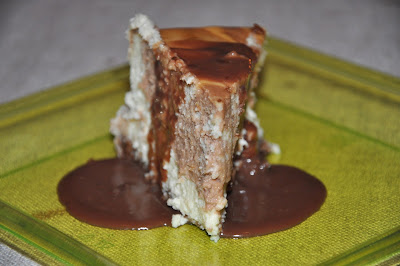My Brazilian family members are a tricky crowd to cook for.
I guess any family has its picky eaters, those who stick to essentially the
same three meals every day and are uncomfortable going outside of those lines –
but my family seems to have quite a large number of them. The week after my
sweet 16, we had at least 15 people coming over to our house for dinner every
night, often more, and I was generally in charge of dessert. I stuck to
something that could be baked in one pan and required little assembly – my
biggest success was this Nutella cake. One night, I decided to make a
cheesecake, per request of my cousin.
Oh boy, I should not have told Brazilians that that was what
I was making. I immediately got wrinkled noses and reactions like, “Really?
Cheese in a cake? I’m gonna go get some ice cream…”
Nevertheless, I powered on. I made a classic New York
cheesecake batter, mixing melted bittersweet chocolate into a portion of it and
swirling that in with the plain batter. To keep with the chocolate-vanilla theme,
I left behind the traditional graham cracker crust and instead used crushed
(gluten-free) chocolate chip cookies. The result? A creamy, melt-in-your-mouth,
insanely delicious double-flavored cheesecake. Even better when served with homemade chocolate sauce! All of my relatives except for
one absolutely loved it. I think I’ll call that one a win and move on.
Enjoy!
Chocolate Swirled Cheesecake
(adapted from Baking: From My Home to Yours)
1 3/4 cups crunchy chocolate chip cookie crumbs
3 tablespoons sugar
Pinch of salt
1/2 stick (4 tablespoons) unsalted butter, melted
2 pounds (four 8-ounce boxes) cream cheese, at room temperature
1 1/3 cups sugar
1/2 teaspoon salt
2 teaspoons pure vanilla extract
4 large eggs, at room temperature
1 1/3 cups sour cream or heavy cream, or a combination of the two
4 oz bittersweet chocolate, melted and cooled
Butter a 9-inch springform pan—choose one that has sides that are 2 3/4 inches high (if the sides are lower, you will have cheesecake batter leftover)—and wrap the bottom of the pan in a double layer of aluminum foil; put the pan on a baking sheet.
Stir the crumbs, sugar and salt together in a medium bowl. Pour over the melted butter and stir until all of the dry ingredients are uniformly moist. (I do this with my fingers.) Turn the ingredients into the buttered springform pan and use your fingers to pat an even layer of crumbs along the bottom of the pan and about halfway up the sides. Don't worry if the sides are not perfectly even or if the crumbs reach above or below the midway mark on the sides—this doesn't have to be a precision job. Put the pan in the freezer while you preheat the oven.
Center a rack in the oven, preheat the oven to 350°F and place the springform on a baking sheet. Bake for 10 minutes. Set the crust aside to cool on a rack while you make the cheesecake.
Reduce the oven temperature to 325°F.
Put a kettle of water on to boil.
Working in a stand mixer, preferably fitted with a paddle attachment, or with a hand mixer in a large bowl, beat the cream cheese at medium speed until it is soft and lives up to the creamy part of its name, about 4 minutes. With the mixer running, add the sugar and salt and continue to beat another 4 minutes or so, until the cream cheese is light. Beat in the vanilla. Add the eggs one by one, beating for a full minute after each addition—you want a well-aerated batter. Reduce the mixer speed to low and stir in the sour cream and/or heavy cream.
Put the foil-wrapped springform pan in the roaster pan.
Give the batter a few stirs with a rubber spatula, just to make sure that nothing has been left unmixed at the bottom of the bowl, and separate about a third of the batter. Stir the bittersweet chocolate into this smaller portion of the batter.
Scrape the vanilla batter into the springform pan. Dollop the chocolate batter over the top and swirl the two together with a thin knife or skewer. The batter will reach the brim of the pan. (If you have a pan with lower sides and have leftover batter, you can bake the batter in a buttered ramekin or small soufflé mold.) Put the roasting pan in the oven and pour enough boiling water into the roaster to come halfway up the sides of the springform pan.
Bake the cheesecake for 1 hour and 30 minutes, at which point the top will be browned (and perhaps cracked) and may have risen just a little above the rim of the pan. Turn off the oven's heat and prop the oven door open with a wooden spoon. Allow the cheesecake to luxuriate in its water bath for another hour.
After 1 hour, carefully pull the setup out of the oven, lift the springform pan out of the roaster—be careful, there may be some hot water in the aluminum foil—remove the foil. Let the cheesecake come to room temperature on a cooling rack.
When the cake is cool, cover the top lightly and chill the cake for at least 4 hours, preferably overnight.




No comments:
Post a Comment